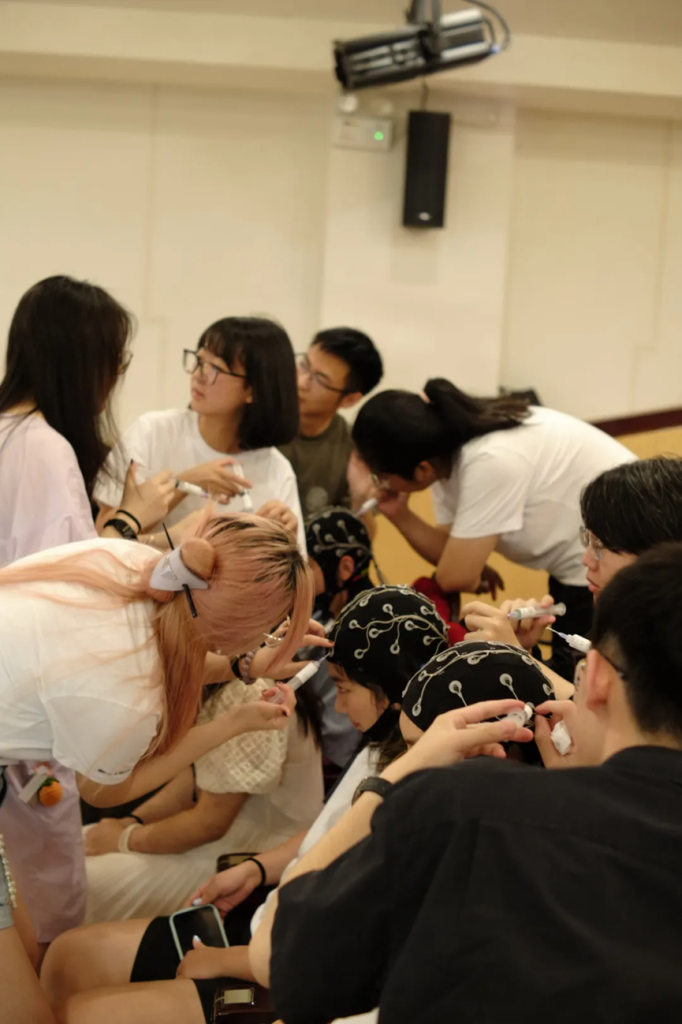Tsinghua Laboratory of Brain and Intelligence (THBI), in collaboration with the Music Library of Tsinghua University Library, successfully organized the “2024 Summer Workshop on Music and Brain Science”. The workshop was held at Tsinghua University from July 1 to July 5, aiming to inspire and cultivate participants’ interest and enthusiasm in the study of the neuroscience of music. The workshop attracted applications from 114 students from universities in China and abroad, and 17 students with backgrounds in science, engineering, and arts education—united by their love for music and ambition to explore brain science—were selected through a competitive process.

The workshop provided students with a series of challenging theoretical lectures and practical training sessions, exploring the latest advances and research methods in the field of music and brain science. The program covered several key themes:
- Neural basis of music: examining the mechanisms by which the brain encodes and processes fundamental musical elements, revealing that neural pathways for music perception and processing are formed from the earliest stages of human development.
- Multisensory nature of music perception: exploring how music perception and performance involve not only hearing but also the integration of tactile and visual information.
- Impact of music training on the brain: showing how sustained musical training can alter brain structure and highlight the role of music in shaping brain plasticity.
- Social functions of music: examining the role of music in society and its unique capacity to foster interaction between musicians and audiences in live performance contexts.
- Technological innovation: exploring cutting-edge developments in multisensory technologies used to create immersive concert experiences and virtual reality music performance environments.
- Artificial intelligence and music: discussing the development of AI-based composition and its applications in music creation.
One of the highlights of the camp was the hands-on training session. Using EEG (electroencephalography) and fNIRS (functional near-infrared spectroscopy) devices to simultaneously record brain activity from multiple participants, students gained firsthand experience in conducting music and brain science experiments, laying an important foundation for their potential future research.

(From left to right, top row: Xiaoqin Wang, Dangxiao Wang; second row: Xiaoguang Liu, Qiyuan Tian, Yifan Xu; third row: Dan Zhang, Juan Huang)

During the workshop, a unique concert combining traditional Chinese music with Western classical works was also held. EEG and fNIRS systems were used to synchronously and in real time record the brain activity of musicians and audience members, exploring how the brain perceives and processes music and how music influences cognition and emotion—serving as both a theoretical and practical demonstration of music and brain science research.
In the first half of the concert, the audience enjoyed a solo performance by young guzheng artist Mengyi Zhang, followed by Chinese ancient melodies performed on restored traditional instruments—including se, zhu, and zhazheng—by scholar Liying Peng, a specialist in Chinese ancient instruments. The second half featured cellist Yao Feng and pianist Zhenyi Wu, who performed classic works showcasing the emotional and technical breadth of Western music, forming a dialogue with the traditional Chinese repertoire of the first half.

(From left to right, top row: Mengyi Zhang, Liying Peng; bottom row: Yao Feng, Zhenyi Wu)
The Music&Brain team of Tsinghua Laboratory of Brain and Intelligence’s is pioneering efforts to integrate traditional Chinese music into modern music neuroscience. Their research on the acoustic properties, timbral characteristics, and perceptual mechanisms of ancient Chinese instruments is a key component of their innovative agenda—an area long neglected by mainstream Western researchers. This concert was not only a cultural feast but also a scientific exploration, reflecting the Laboratory’s forward-looking vision of uniting science and art.
The team aims to foster a more comprehensive and inclusive understanding of music’s impact across cultures and to innovate methodologies in real-world concert neuroscience research. Traditionally, music and brain studies have been confined to tightly controlled laboratory environments. By recording brain activity and physiological signals of musicians and audiences in live concert settings, researchers hope to obtain naturalistic data on how music affects the human brain.
Professor Xiaoqin Wang, Director of the Brain and Intelligence Laboratory, stated: “Through this unique training workshop and concert, we aim not only to bridge Eastern and Western musical traditions, but also to expand research methodologies in music and brain science, enriching our understanding of music perception and its therapeutic potential.”



The summer workshop was strongly supported by the Tsinghua University Library and the Tsinghua University Art Education Center. During the program, students also visited the Central Conservatory of Music, a key partner of the Tsinghua University Brain and Intelligence Laboratory. Building on the success of this inaugural camp, Tsinghua University plans to expand the program into an international summer camp in the coming years, attracting more students from around the world. The initiative aims to further promote international exchange and collaboration in music and brain science, establishing itself as an influential educational project at the intersection of music, neuroscience, and the arts.
